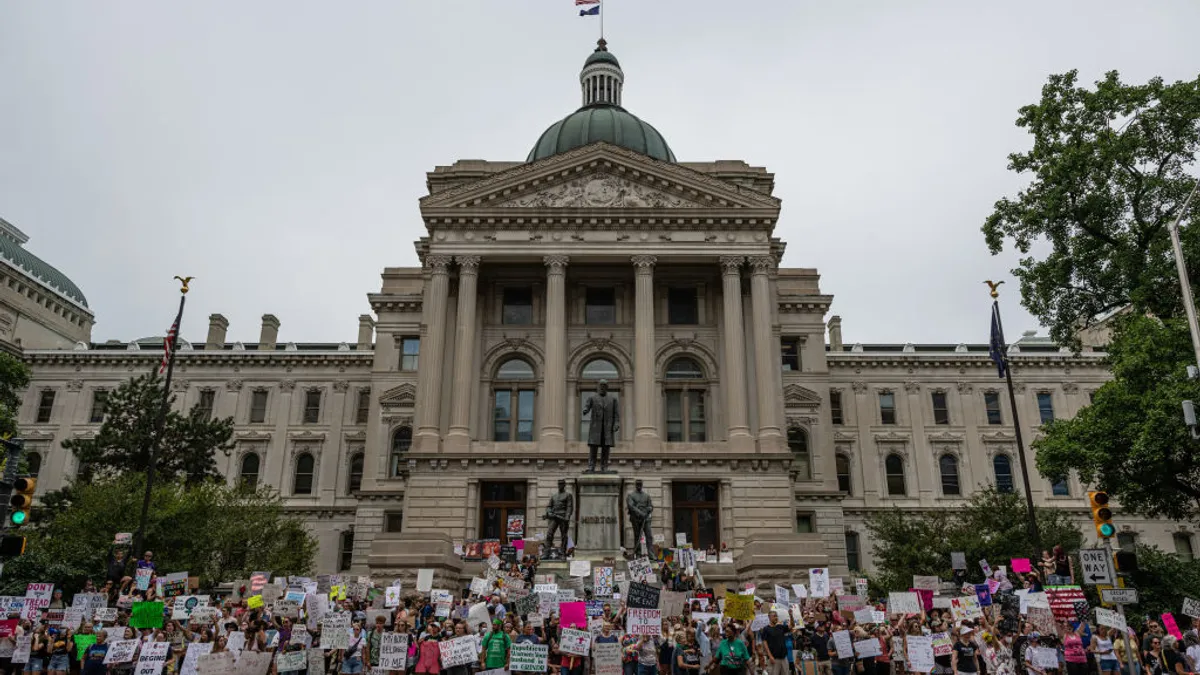Employers in Indiana say the state’s passage of a law outlawing abortions except in limited circumstances could hurt their ability to retain and attract talent.
Eli Lilly & Co., the pharmaceutical firm based in the state capital of Indianapolis, said in an email statement to HR Dive that it would be forced to plan for more employment growth outside of Indiana. The company also said that while it had expanded its employee health coverage to include travel for reproductive services that are unavailable locally, “that may not be enough for some current and potential employees.”
“Lilly recognizes that abortion is a divisive and deeply personal issue with no clear consensus among the citizens of Indiana,” the company added. “Despite this lack of agreement, Indiana has opted to quickly adopt one of the most restrictive anti-abortion laws in the United States. We are concerned that this law will hinder Lilly’s — and Indiana’s — ability to attract diverse scientific, engineering and business talent from around the world.”
Indiana Gov. Eric Holcomb signed into law Aug. 5 Senate Bill 1, which categorizes abortion as a criminal act under state law.
The law’s provisions do include some exceptions. For example, in pregnancy cases involving a serious health risk to a pregnant woman or diagnosis of a lethal anomaly in the fetus, it does not prohibit abortions if they occur before the earlier of either fetal viability or 20 weeks postfertilization.
Other sections of the law stipulate exceptions in cases of rape or incest. Separately, the law terminates the licensure of abortion clinics in the state. Indiana is the first state to enact new prohibitions against abortion since the U.S. Supreme Court struck down Roe v. Wade in June.
Lilly was not the only Indiana employer to voice opposition to the law. Cummins, a large manufacturer headquartered in Columbus, Indiana, said in an Aug. 6 statement that it would consider the state’s abortion ban in making expansion decisions.
“We are deeply concerned about how this law impacts our people and impedes our ability to attract and retain a diverse workforce in Indiana – concerns that we have voiced to legislators,” the company said. “Cummins believes that women should have the right to make reproductive healthcare decisions as a matter of gender equity, ensuring that women have the same opportunity as others to participate fully in the workforce and that our workforce is diverse. This law is contrary to this goal and we oppose it.”
The overturning of Roe led a number of U.S. organizations to respond by expanding or otherwise clarifying benefits available to employees seeking access to reproductive care, including abortion.
An executive of Dick’s Sporting Goods stated in a LinkedIn post following the Supreme Court’s ruling that the retailer would offer up to $4,000 in travel expense reimbursement to employees who live in a state that restricts their access to abortion and who travel to the nearest location where such care is legally available. An internal memo sent to employees of The Walt Disney Co. in June said that the company would help workers pay for pregnancy-related care travel, CNBC reported.
A recent survey of more than 200 employers by the Integrated Benefits Institute found that about 62% covered paid time off for employees that need abortion services, including travel and recovery, according to results shared with HR Dive. IBI also found that about 46% of respondents said they were considering making changes to their medical coverage for abortion.
But some employers who have made such pledges are already seeing backlash. Dick’s Sporting Goods, for example, is the subject of a July letter to the U.S. Equal Employment Opportunity Commission filed by America First Legal, a conservative legal group. America First Legal asked the EEOC to open an investigation of Dick’s Sporting Goods, alleging that the company’s travel benefit violated Title VII of the 1964 Civil Rights Act.
Legal liabilities are just a sample of the hurdles employers may face in offering benefits related to obtaining an abortion in the post-Roe environment, sources previously told HR Dive. Wading into political waters may also result in difficult workplace conversations; sources have advised employers to structure conversations about abortion access with intentionality and empathy.













